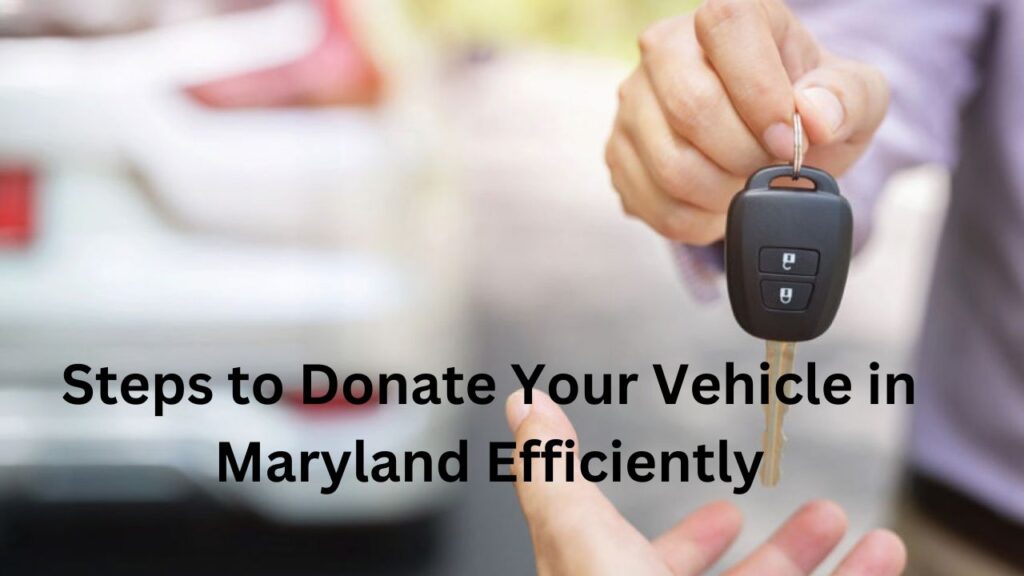Steps to Donate Your Vehicle in Maryland Efficiently
Donating your vehicle in Maryland is a generous way to support a charitable cause, but to ensure the process goes smoothly, it’s important to follow the right steps. Whether your car is running or not, donating it can be an easy and rewarding experience. To help you navigate the process efficiently, here’s a step-by-step guide on how to donate your vehicle in Maryland.
Step 1: Choose the Right Charity
The first step in donating your vehicle is choosing a reputable charity that aligns with your values. Maryland has a variety of local and national organizations that accept car donations, including those focused on health, veterans, children, animal rescue, and community programs.
Take the time to research the charity’s mission and ensure they are a 501(c)(3) nonprofit organization, which will allow you to claim a tax deduction. You can use online resources like Charity Navigator or GuideStar to check their ratings, financial transparency, and impact.
Step 2: Understand How the Charity Handles Car Donations
Not all charities handle car donations in the same way. Some may sell the vehicle and use the proceeds to fund their programs, while others may keep the car for their own use. It’s important to understand how your donation will be used, especially if you’re hoping to receive a tax deduction.
- Sale: If the vehicle is sold, your tax deduction will typically be based on the sale price.
- Use: If the charity plans to use the car directly (for instance, for transportation in a program), you may be eligible to deduct the car’s fair market value.
Make sure to ask the charity how they handle donated vehicles and confirm how the donation process works.
Step 3: Gather the Necessary Documentation
Before donating your vehicle, ensure you have all the necessary paperwork ready. This typically includes:
- Title: The car’s title is essential to legally transfer ownership. If you don’t have the title, you’ll need to apply for a duplicate through the Maryland Department of Transportation (MDOT).
- Registration: You should also have the vehicle’s registration, though some charities may only require the title for donation purposes.
- Identification: Be prepared to provide a form of identification, like a driver’s license, to verify your identity.
If your vehicle is missing any documentation, contact the MDOT to get the required paperwork before proceeding with the donation.
Step 4: Schedule Pickup or Drop-Off
Most charities in Maryland offer free towing services for vehicle donations, which is especially convenient if your car is not running. When you contact the charity, confirm if they offer this service and arrange a time for them to pick up the vehicle from your location.
If you prefer to drop the car off at the charity’s location, make sure to confirm their hours of operation and any specific instructions for drop-off. Be sure to remove all personal items from the car and take the license plates off, as required by Maryland law.
Step 5: Transfer Ownership and Complete the Paperwork
Once the vehicle is picked up or dropped off, you’ll need to officially transfer ownership to the charity. In Maryland, you must complete a title transfer to avoid any liability issues down the road.
- Title Transfer: Sign the title over to the charity and make a copy of the signed title for your records. This helps protect you from any future legal or financial responsibility related to the vehicle.
- Release of Liability: You may also need to complete a “Release of Liability” form with the MDOT, which notifies the state that you no longer own the vehicle. This protects you in case the car is involved in any accidents or legal issues after donation.
Ensure you receive a donation receipt from the charity, as you will need this for tax purposes.
Step 6: Get Your Donation Receipt and Tax Deduction Information
After your vehicle is donated, the charity should provide you with a receipt. This receipt is essential for claiming a tax deduction. The receipt should include:
- The charity’s name and contact information
- A description of the vehicle (make, model, year)
- The date of donation
- Whether any goods or services were provided in exchange for the donation
If the car sells for more than $500, the charity is required to send you IRS Form 1098-C, which details the sale price. If the vehicle is kept for the charity’s use, the fair market value of the car may be used for the tax deduction.
Step 7: Finalize the Process with the DMV
Once the donation is complete, make sure you handle any remaining DMV requirements, such as:
- Canceling the Registration: You may need to cancel the car’s registration with the MDOT to avoid future insurance or tax obligations.
- Removing License Plates: In Maryland, the license plates remain with the owner, so you should remove them from the vehicle before donating.
This ensures you are no longer responsible for the vehicle once it is donated.
Conclusion
Donating a car in Maryland is a straightforward process when you follow the right steps. By choosing a reputable charity, preparing the necessary documentation, and transferring ownership correctly, you can ensure that your car donation benefits a cause you care about while also taking advantage of potential tax deductions. Whether you’re donating a running vehicle or one that’s no longer functional, the steps outlined above will help you donate efficiently and with confidence.
Complete Steps to download the file.
1) Go to the Image you see and a random Website will open (wait for it to fully load).
2) Then copy the URL Link of the Website and paste it below in the text-box
3) Click on “send” to receive the Download Link
Troubleshooting for instant download
1) If you are unable to see any pic try refreshing page 3 times or please use a VPN App and connect to USA, Canada, UK, or any other country.
2) Make sure Adblock is turned off
3) Try again the next day as you may have reached the limitWhen we have problems related to our insurance claims. we have to contact the insurance claim adjusters. An insurance adjuster is a responsible person for his company’s legal matters. No matter what’s the scenario he always thinks about the benefits of his company. So according to his company’s own beneficial rules, he gathers information about the incidents and always tries to benefit his company. So it all depends on you how you can deal with them better to secure your claims and save your money.
If you are also facing this problem and want to know about “how to talk to insurance claim adjusters”? Then you are in the right spot. By reading this you cannot confidently handle insurance claim adjusters.
At first. it looks like they are only your well-wishers and they pretend to be so. You will think that they want to facilitate you but the reality is the opposite. Insurance companies are manipulating you because they only work for their own company, not for you.
They will try to keep you in darkness by keeping you away from your legal adviser and will show that they will control all aspects and you have no need to go to a lawyer. They pretend to give you full money to restore your property but in reality, they want to give you as little as possible.
In the topic “how to talk to insurance claim adjusters”? I’m further adding that Before talking to an insurance company you first get advice from some related best sources. Insurance adjusters control these matters throughout the day. they are experts. So if you go to them with proper preparation then you can successfully claim your damage. But if you do not prepare yourself you will fail. You will lose your claim. In this matter you must hire a lawyer then he will control the situation successfully
Thank you



